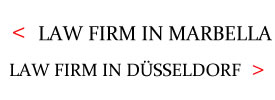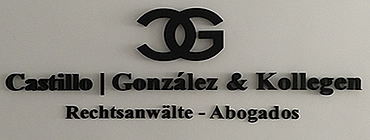- Düsseldorf
- |
- +49 (0) 211 - 163-751-76
- |
- CONTACT PER E-MAIL
- Marbella
- + 34 95 - 108-11-16
- |

- |

- |

Lawyer for Establishment and Spain SL & Spanish GmbH
According to the Spanish National Statistics Institute, the Spanish economy will continue to grow in the future. For foreign companies there are still interesting business opportunities on the Spanish market. What counts here, as with any other economic enterprise, is that you get competent advice before making your decision, especially when choosing the right legal form for society, thereby setting the course for economic success.
The following information is therefore intended to help you make a decision about which legal form is suitable for your economic activity in Spain. Spanish company law, like German law, provides several legal forms that you can use for your business venture. In addition to the sole proprietorship, which is not advisable from the point of view of liability law, the legal forms of the Spanish GmbH (Sociedad Limitada, SL) or the Spanish public limited company (Sociedad Anonima, SA) are recommended.
1. General characteristics of an SL (Spanish GmbH):
The spanish GmbH (SL) is the youngest legal form of company, but one of the most flexible legal forms that can be customized to meet the specific needs of the partner (s). It should be emphasized that liability towards creditors is limited to the company's assets. Since the reformed Spanish GmbH law, Einmann GmbHs have also been permitted. However, special provisions apply to this, which must be expressed in the charter. The minimum share capital of an SL is EUR 3006 and must be paid in full when the company is founded. This must be proven by bank confirmation. The share capital is to be divided into business shares, whereby these do not have to be divided equally among several shareholders. The master contribution can also be made as a contribution in kind, in comparison to the SA there is no need for an expert opinion. The shareholders' meeting is the highest decision-making body in society, quasi its parliament. It determines the managing director (s) of the company, who in Spain are called administradores. These are the executive body of society and represent it externally. You do not have to be a partner or have Spanish citizenship. Furthermore, it is also permissible to install a board of directors. However, this is only recommended for larger companies with several partners (at least 10). In principle, a smaller company has one or two administrators, whereby, depending on the deed of foundation and the will of the partners, they are authorized to represent the company individually or collectively. The foundation takes place through notarial deed of foundation (Escritura de Constitución de Sociedad). The charter must contain a statute, either as part of the actual charter or enclosed as a separate charter. All essential details of society are to be regulated here, the basic law of society. The following points should not be missing: the company of the company, i.e. its name, the purpose of the foundation, i.e. its business activity, the business year, the seat of the company, the share capital and its division, the management. With the registration of the company in the commercial register, the company acquires its final legal capacity. Nonetheless, the company will start operating beforehand, but without the protection of the liability limitation on the company's capital.
2. General characteristics of an SA (Spanish AG):
The minimum share capital is 60,102 euros. This must be fully subscribed and 25% of the nominal share value must be paid up when the company is founded. There is no minimum number of shareholders to set up an SA. The shareholders' meeting is the highest decision-making body and is authorized to designate the board (s) (administradores in Spanish). They represent the SA externally and do not have to be shareholders and do not have Spanish citizenship. Otherwise, what has been said about the SL applies.
3. Labor law aspects / entrepreneurial obligations :
Every entrepreneur has to observe the care of a prudent businessman in his work, this also applies in Spain. The bookkeeping is to be kept properly, for this the entrepreneur has to keep business books (among other things, decision book, registered share book, contract register, register of shareholders), as well as an inventory book with annual accounts and a diary. The annual accounts must be prepared within three months of the end of the financial year. The company must contractually employ at least one person and register with social security, which may also be the administrator, the shareholder or a member of the board, as long as there is a real employment relationship. However, they are not entitled to unemployment benefits.
4. Tax aspects:
Spanish corporations, which include the SL and the SA, are subject to Spanish corporate tax insofar as they are located in Spain. A company based in Spain is established in Spain and is based in Spain. Corporate income tax applies to all income earned by the company, including those generated abroad. The tax base is always the fiscal year. The general tax rate for corporation tax is 35%. The tax rate for non-residents is between 25% and 35% depending on the type of income tax. According to the German-Spanish double taxation agreement, the exemption method is applied. In other words, from the point of view of the country of residence (place of residence, habitual residence), income earned abroad is exempt, but is subject to the progression reservation in Germany. In this case, the taxation right belongs to the non-resident state (abroad). In terms of the situation of a German entrepreneur who operates a Spanish SL, this means that the German entrepreneur has his habitual residence in Germany, but the SL is based in Spain, this has the following effects on the individual tax types:
5. Corporation tax :
Taxation is based on residence. Resident corporations are subject to corporation tax with worldwide income and capital gains. The general tax rate for income and capital gains is currently 35%. For companies with sales of less than 8 million euros and profits of less than 120,000 euros, the revised tax rate is currently 30%. The withholding tax rate on dividends and other profit distributions, on interest and on licenses is currently 18%. However, this only applies if no business premises are maintained in Spain.
6. Income tax :
German entrepreneurs who spend less than 183 days a year in Spain are subject to taxation for non-residents on income and capital gains from Spanish sources. For income that a German shareholder receives from the activity as managing director of the SL, the principle applies that income from dependent work is taxed in the state in which the dependent work is carried out. If the German entrepreneur employed as managing director has his habitual residence in Germany and is subject to the unlimited German income tax liability, the income from non-self-employed work (in Spain) within the meaning of § 19 dtEStG must be exempted for the area of ??wages and salaries. Trade tax: This tax is intended to tax the exercise of entrepreneurial, freelance or artistic activities by legal entities. The tax does not apply during the first two taxation periods in which the activity is carried out, and for net sales of less than EUR 1 million.
7. Foundation process :
a) negative name query at the central commercial register in Madridb) Application for a tax number (NIE) for the partners
c) Opening and opening of a bank account with a bank based in Spain and payment of the share capital
d) Elaboration of a charter along with the articles of association
e) Notarial certification
f) Application for a tax number for the company (CIF)
At this stage you will receive a preliminary CIF for the company in formation
g) Payment of the so-called stamp tax, the tax on capital transfers and documented legal acts (ITP AJD) in the amount of 1% of the company's capital (period: 1 month)
h) Entry in the commercial register
i) Obtain the Company's Final Tax Number (CIF)
: Our law firm in Düsseldorf & Marbella represents you throughout Europe :
We also represent you with your concerns and interests in other European countries. Our qualified and competent advice and representation in Spanish and German law means for us that we as German lawyers and Spanish Abogados represent your concerns in Alicante. And always with the necessary persistence and the necessary specialist knowledge and competence. Simply contact us and simply describe your concerns or interests to us.







